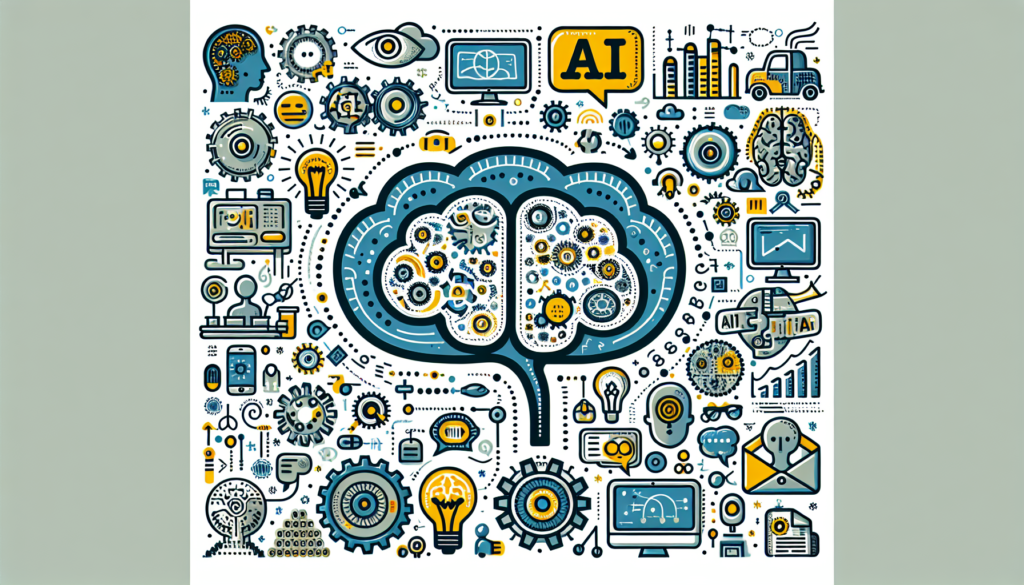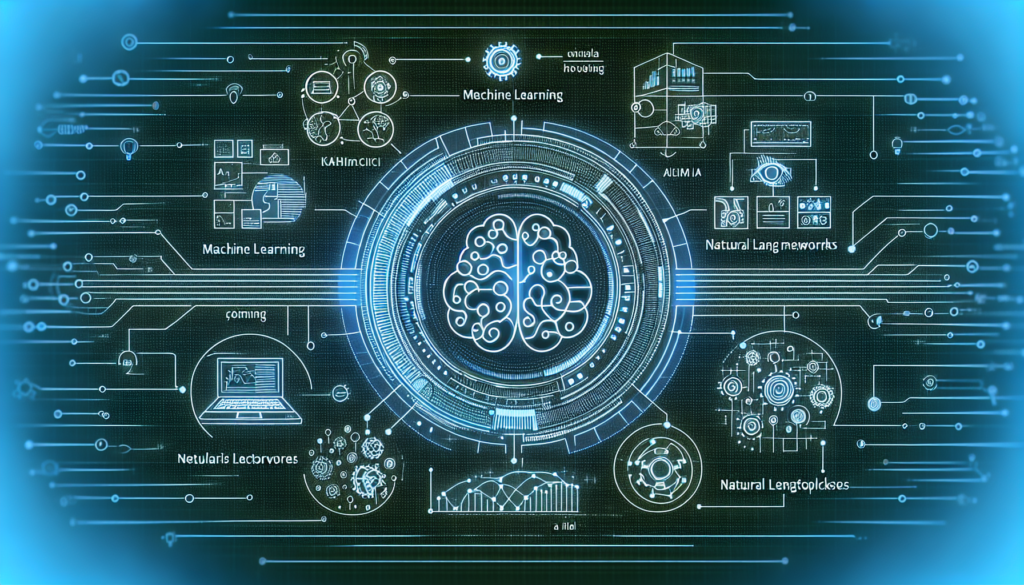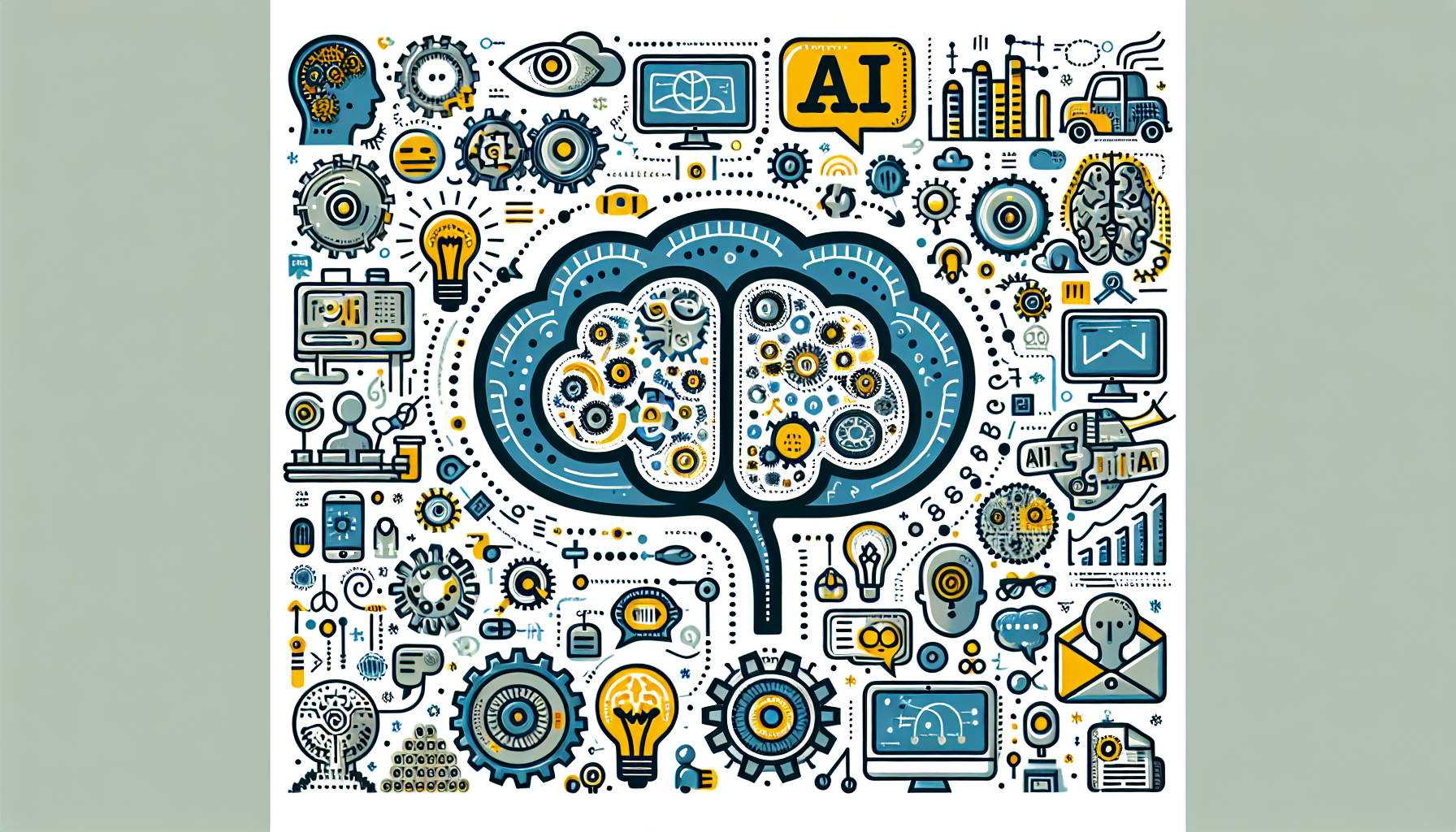Artificial Intelligence, or AI, is a concept that has rapidly captured the attention and interest of people worldwide. It refers to the field of computer science that focuses on creating intelligent machines capable of carrying out tasks that typically require human intelligence. From self-driving cars and virtual assistants to personalized recommendations and advanced data analytics, AI is revolutionizing various industries and transforming the way we live and work. In a simple way, artificial intelligence can be seen as the development of computer systems that exhibit characteristics similar to human intelligence, such as learning, problem-solving, and decision-making. So, buckle up and prepare to embark on a journey of understanding the fascinating world of AI!
What is Artificial Intelligence?
Defining Artificial Intelligence
Artificial Intelligence (AI) refers to the simulation of human intelligence in machines that can complete tasks that would typically require human intelligence. It involves the development of computer systems capable of performing tasks that usually demand human intelligence, such as problem-solving, pattern recognition, decision-making, and learning.
The Purpose of Artificial Intelligence
The primary purpose of AI is to enable machines to successfully replicate human-like intelligence and behaviors. By using algorithms and advanced technologies, AI aims to enhance efficiency, productivity, accuracy, and decision-making capabilities across various industries and sectors. It has the potential to revolutionize the way we live, work, and interact with technology.
Different Types of Artificial Intelligence
There are different types of AI, each with its own unique characteristics and capabilities.
-
Weak AI: Also known as Narrow AI, it is designed to perform specific tasks within a limited domain. Examples include virtual assistants like Siri, recommendation systems, and fraud detection algorithms.
-
Strong AI: This form of AI, also called Artificial General Intelligence (AGI), possesses intelligence that matches or exceeds human cognition. Strong AI can understand, learn, and apply knowledge in a broad range of scenarios independently. Development of Strong AI is still theoretical and under exploration.
-
Machine Learning: Machine Learning is a subset of AI that involves training machines to learn from data and improve their performance over time. It focuses on developing algorithms that enable systems to learn from experience instead of being explicitly programmed.
-
Deep Learning: Deep Learning is a specific subset of Machine Learning that mimics the functioning of the human brain. It involves training artificial neural networks using a vast amount of data. Deep Learning has revolutionized fields such as computer vision, natural language processing, and speech recognition.
-
Neural Networks: Neural Networks are a fundamental component of AI systems. Inspired by the organization of the human brain, neural networks consist of interconnected layers of artificial neurons that process and transmit information. They are used in various AI applications, such as image recognition and language translation.
The History of Artificial Intelligence
Early Beginnings of AI
The concept of AI dates back to antiquity, with ancient myths and folklore often mentioning the creation of artificial beings. However, modern AI research began in the 1950s, largely influenced by the development of computers and the desire to create intelligent systems capable of human-like reasoning.
Milestones in AI Development
Over the years, AI has achieved significant milestones:
-
1956 – Dartmouth Conference: Considered the birth of AI as an official academic discipline, this conference brought together researchers who aimed to explore the potential of AI and develop intelligent machines.
-
1997 – Deep Blue Beats Kasparov: IBM’s Deep Blue computer defeated the world chess champion Garry Kasparov, showcasing the progress of AI in complex decision-making tasks.
-
2011 – IBM Watson’s Jeopardy!: IBM’s Watson demonstrated its ability to understand and process natural language by winning the Jeopardy! game show against human contestants.
Current State of AI
In recent years, there has been remarkable progress in AI due to advancements in computing power, big data, and algorithmic innovations. AI technologies, such as virtual assistants, autonomous vehicles, and intelligent personalization systems, have become increasingly common in everyday life. While AI still has room for improvement, its current capabilities are transforming industries and paving the way for further advancements.

How Does Artificial Intelligence Work?
Machine Learning
Machine Learning enables AI systems to learn and improve from data without being explicitly programmed to perform specific tasks. It involves the development of algorithms that automatically identify patterns, extract meaningful insights, and make predictions or decisions based on the data provided.
Supervised learning, unsupervised learning, and reinforcement learning are the three primary categories of Machine Learning. Supervised learning uses labeled data to train models, unsupervised learning finds patterns in unlabeled data, and reinforcement learning involves training models to make decisions based on feedback from an environment.
Deep Learning
Deep Learning, a subset of Machine Learning, is inspired by the structure and functioning of the human brain. It utilizes artificial neural networks with multiple layers to process and analyze complex patterns in vast amounts of data. Deep Learning has proven to be remarkably successful in solving complex tasks like image and speech recognition due to its ability to automatically learn hierarchical representations.
Neural Networks
Neural Networks are the building blocks of AI systems. They resemble the interconnected structure of neurons in the human brain and are composed of layers of artificial neurons called nodes. Each node processes incoming information and transmits it to the nodes in the subsequent layer. This process allows neural networks to recognize patterns, classify data, and make predictions.
Applications of Artificial Intelligence
Natural Language Processing
Natural Language Processing (NLP) focuses on the interaction between computers and human language. It enables machines to understand, interpret, and generate human language, making it possible for virtual assistants like Siri and chatbots to comprehend and respond to spoken or written language.
NLP has various applications, such as language translation, sentiment analysis, voice recognition, and text generation. It plays a crucial role in improving human-computer interaction, automating customer support, and extracting insights from massive amounts of textual data.
Computer Vision
Computer Vision allows machines to see and interpret visual information similar to the human visual perception system. It involves analyzing and understanding digital images and videos, enabling AI systems to recognize objects, identify faces, detect anomalies, and even drive autonomous vehicles.
Computer Vision finds applications in sectors like healthcare (diagnostic imaging), security (surveillance and facial recognition), agriculture (crop monitoring), and manufacturing (quality control). It has the potential to revolutionize various industries by enhancing efficiency, accuracy, and safety.
Speech Recognition
Speech Recognition technology enables machines to understand and process spoken language. It involves converting audio signals into text or commands, which can then be used to interact with AI systems. Leading companies have developed smart speakers and voice assistants like Amazon Echo and Google Home that use speech recognition to perform tasks, provide information, and control other smart devices.
Speech recognition has applications in areas such as transcription services, call center automation, voice assistants, and accessibility tools for individuals with disabilities. Advancements in speech recognition have significantly improved the accuracy and naturalness of human-computer speech interaction.

Benefits and Challenges of Artificial Intelligence
Advantages of AI
AI presents numerous benefits across different sectors and industries. Some of the advantages include:
-
Increased Efficiency and Productivity: AI technologies can automate repetitive tasks, reducing human error and increasing speed and efficiency. This allows organizations to focus on high-value activities, leading to increased productivity.
-
Improved Decision-Making: AI systems can analyze vast amounts of data quickly and accurately, enabling better decision-making. They can identify patterns, trends, and insights that humans might miss, leading to more informed choices.
-
Enhanced Personalization: AI-powered recommendation systems and personalized marketing techniques can provide customized experiences for individuals. This allows businesses to deliver targeted content, products, and services, improving customer satisfaction and loyalty.
Ethical Concerns
As AI continues to advance, several ethical concerns have emerged that need careful consideration:
-
Bias and Fairness: AI systems can inherit biases present in the data used to train them, leading to discriminatory outcomes. Ensuring fairness and mitigating biases is crucial to prevent discriminatory practices and ensure equal opportunities.
-
Privacy and Security: AI technologies often require access to vast amounts of personal data. Protecting individuals’ privacy and ensuring secure data handling is essential to avoid misuse or unauthorized access. It is crucial to establish robust data protection regulations and ethical frameworks.
-
Accountability and Transparency: AI systems often operate as black boxes, making it challenging to understand their decision-making process. Establishing accountability and transparency mechanisms is vital to ensure the responsible use of AI and enable users to trust the technology.
Impact on Employment
The rise of AI has raised concerns about its impact on the job market. While AI can automate certain tasks, it also has the potential to create new job opportunities and transform existing roles. Many routine and repetitive jobs may be susceptible to automation, but AI can also enable the development of new industries and occupations. Reskilling and upskilling the workforce are crucial to adapt to the changing employment landscape.
The Future of Artificial Intelligence
Emerging Technologies
Several emerging technologies have the potential to shape the future of AI:
-
Explainable AI: Researchers are actively working on developing AI models that can provide explanations for their decisions and actions. This helps build trust and transparency, enabling users to understand the reasoning behind AI-driven decisions.
-
Quantum Computing: Quantum computers have the potential to revolutionize AI by significantly improving processing power. They can solve complex problems more efficiently and accelerate advancements in AI development.
AI in Various Industries
AI is already making an impact across various industries and is expected to drive further transformations in the future:
-
Healthcare: AI is being used to improve medical diagnosis, drug discovery, personalized treatment plans, and patient monitoring. It has the potential to enhance disease prevention, accelerate research, and reduce healthcare costs.
-
Finance: AI-powered algorithms are revolutionizing financial institutions by enhancing fraud detection, automating underwriting processes, and providing personalized financial advice. AI can improve risk management, fraud prevention, and customer experience in the finance sector.
Potential Risks
While AI brings immense possibilities, it also poses potential risks that need to be addressed:
-
Job Displacement: As AI automates certain tasks, it may lead to a decrease in employment opportunities for certain job roles. It is crucial to consider the social consequences and ensure a smooth transition for affected individuals.
-
Dependence on Technology: Over-reliance on AI systems without considering their limitations and potential failures can have severe consequences. Maintaining human oversight and building robust fail-safe mechanisms is necessary to prevent catastrophic failures and ensure responsible use of AI.
Artificial General Intelligence vs Artificial Narrow Intelligence
Differences between AGI and ANI
Artificial General Intelligence (AGI) refers to AI systems that possess human-like cognition and intelligence. AGI can understand, learn, and apply knowledge in a broad range of scenarios, similar to human thinking. On the other hand, Artificial Narrow Intelligence (ANI) refers to AI systems designed for specific tasks within a limited domain. ANI exhibits intelligent behavior in a narrow range of applications but lacks the general cognitive abilities of AGI.
While ANI is prevalent in today’s AI applications, AGI remains more theoretical and under development. Achieving AGI would mark a significant milestone in AI history, as it would mean machines with human-like intelligence and problem-solving capabilities.
Advantages and Limitations
AGI holds immense potential in various sectors, including healthcare, education, research, and even creativity. AGI could solve complex problems, create innovative solutions, and support human decision-making in unprecedented ways. It has the potential to drive significant advancements in multiple industries, leading to improved quality of life for individuals.
However, there are significant challenges in developing AGI. Building machines that possess human-like cognition and consciousness is a complex and interdisciplinary task. Ethical concerns, computational power requirements, and ensuring responsible use are among the limitations that need to be addressed before AGI becomes a reality.
Ethical Considerations in Artificial Intelligence
Fairness and Bias
AI systems can perpetuate biases present in the data used for their training. It is essential to develop AI algorithms and frameworks that are fair and unbiased, ensuring that AI does not discriminate based on race, gender, or other protected attributes. Continuous monitoring and auditing of AI systems can help identify and rectify biases, promoting fairness and equal opportunities.
Privacy and Security
AI often requires access to vast amounts of personal data, raising privacy concerns. Organizations must prioritize privacy and security by implementing robust data protection measures, encrypting sensitive information, and obtaining user consent. Stricter regulations and transparent data handling practices are necessary to maintain user trust and protect personal privacy.
Accountability and Transparency
AI systems often operate as black boxes, providing little visibility into their decision-making process. To ensure accountability and transparency, developers of AI technology need to make efforts to explain the reasoning behind AI-driven decisions. This can involve creating explainable AI models and establishing mechanisms for auditing and reviewing AI systems.
Artificial Intelligence in Everyday Life
Smart Assistants
Smart assistants such as Siri, Google Assistant, and Amazon Alexa have become increasingly prevalent in households. These AI-powered virtual assistants can perform a variety of tasks, including answering questions, setting reminders, and controlling smart home devices. Smart assistants have simplified daily tasks, offering convenience and personalized experiences.
Recommendation Systems
AI-driven recommendation systems are commonly used in online platforms like Netflix, Amazon, and Spotify. These systems analyze user preferences and behavior to suggest relevant content, products, or services. Recommendation systems have transformed the way we discover and consume content, making personalized suggestions and improving user experience.
Autonomous Vehicles
The development of autonomous vehicles is a significant breakthrough in AI. These vehicles use AI technologies like computer vision and machine learning to navigate and make decisions on the road. Autonomous vehicles have the potential to enhance road safety, reduce traffic congestion, and provide mobility solutions for individuals who cannot drive. While still under development, autonomous vehicles are expected to have a profound impact on transportation in the future.
Education and Careers in Artificial Intelligence
AI Education Programs
As the demand for AI professionals grows, many educational institutions offer specialized programs in AI and related fields. These programs equip students with the knowledge and skills required to develop AI solutions, analyze data, and understand the ethics and societal implications of AI. AI education programs range from undergraduate degrees to specialized certifications and online courses.
AI Job Market
The job market for AI professionals is rapidly expanding. There is a high demand for AI engineers, data scientists, AI researchers, and AI ethicists in various industries, including healthcare, finance, and technology. Professionals with expertise in machine learning, deep learning, natural language processing, and data analysis are sought after by companies aiming to leverage AI technologies.
In-Demand AI Skills
To succeed in an AI career, individuals need to develop specific skills:
-
Programming: Proficiency in programming languages like Python, R, and Java is essential for building AI models and algorithms.
-
Machine Learning: A strong understanding of machine learning concepts, algorithms, and frameworks is crucial for developing AI systems.
-
Data Analysis: Skills in data preprocessing, exploration, and analysis are vital to extract meaningful insights from data and train AI models.
-
Problem-Solving: AI professionals should have excellent problem-solving abilities to tackle complex challenges and optimize AI solutions.
-
Communication and Collaboration: Effective communication and collaboration skills are necessary to work in multidisciplinary teams and convey AI concepts to stakeholders effectively.
In conclusion, Artificial Intelligence is a transformative technology with immense potential in various domains. It has evolved significantly over the years, and its applications, such as natural language processing, computer vision, and speech recognition, are becoming increasingly prevalent in everyday life. While AI offers numerous benefits, including increased efficiency, improved decision-making, and enhanced personalization, it also raises ethical concerns, such as fairness, privacy, and accountability. The future of AI holds promising possibilities but also requires careful consideration and responsible development, ensuring its alignment with human values and societal needs. As AI continues to progress, education and careers in AI play a critical role in shaping the future of this revolutionary technology.
